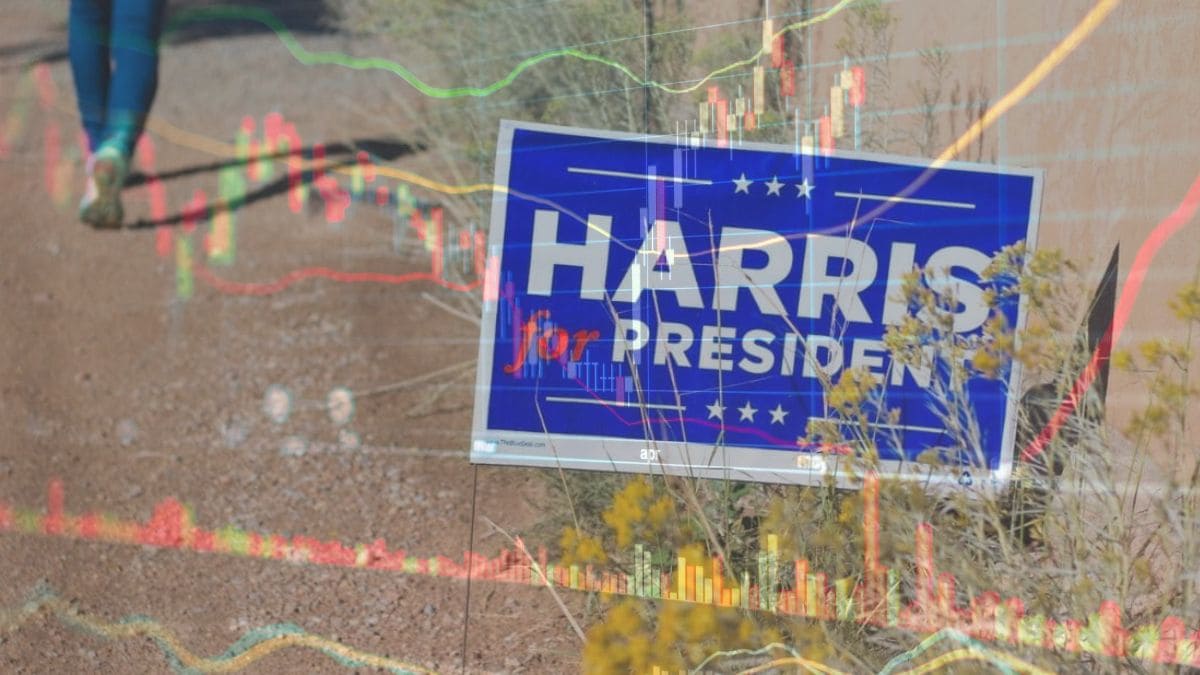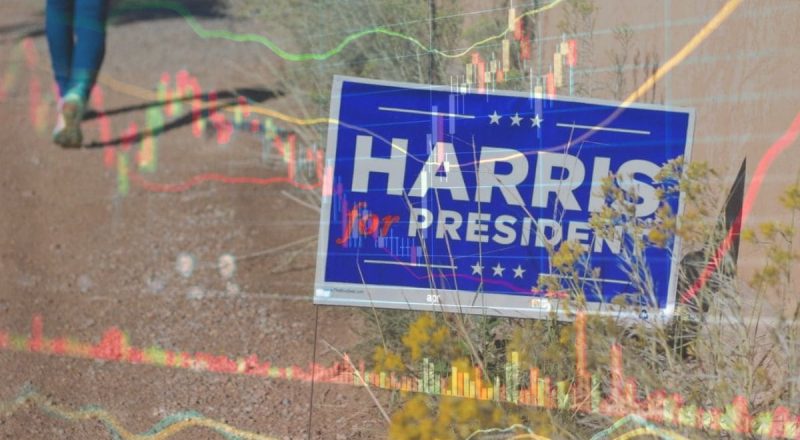
Empiricus Research analyst discusses which sectors of the economy could stand out if the current vice president takes over the White House in January (Image: iStock.com/JannHuizenga | Editing: Anna Zeferino)
We are 40 days away from finding out who will be the next president of the United States. With Donald Trump and Kamala Harris in a virtual tie in most polls, investors around the world have been discussing what to expect from the markets if either of them wins.
The US is still the largest economy on the planet, home to the largest companies and stock exchanges in the world, the strongest fiat currency (the dollar) and the interest rate considered the main reference for the rest of the market.
Therefore, we spoke with analyst Matheus Spiess, from Empiricus Research, the BTG Pactual group's analysis firm, to understand what the impacts of the US election will be on the economy and investments if each candidate wins.
In this first article, we will focus on what could happen if current Vice President Kamala Harris wins the race for the White House. Are there specific opportunities that will open up in the market if the Democrat takes power?
What to expect from the market in a Kamala Harris government
Before we continue with the interview, it is worth highlighting that the subject is quite complex to be covered in a single text.
And that's why Market Makers invites you to participate in a exclusive, online and free event dedicated entirely to discussing the American elections, listening to leading experts on the subject. You can now secure your place clicking here.
Trump trade x Kamala trade
There is a lot of talk in the market about the “Trump trade” – investors positioning themselves in assets that benefit from Donald Trump’s policies.
But what about the other way around – is there a Kamala trade?
According to Spiess, it does exist, but it is less talked about, and the reason is simple: a Kamala Harris government may not bring surprises beyond what we have already known from the current government since 2021:
“The market talks less (about Kamala) because she has presented fewer proposals than Trump. Her proposals are more vague. (…) Not to mention that we have had four years of Democratic government. She was Joe Biden’s vice president, (so) it would be the continuation of what we saw. Maybe (only) with some more progressive contours (…) but it is difficult to say – that is why people have given little emphasis.”
But, in any case, the analyst provided an overview of what it means to expect “more of the same” in a new Democratic government.
FEES
According to the analyst, with Kamala Harris as president, the Federal Reserve's interest rate cut cycle (the US Central Bank) should continue at its current pace.
Higher interest rates and inflationary pressure are more associated with a possible Trump administration. “Trump’s proposals are more inflationary,” according to him. Meanwhile, Kamala defends tax increases, a more contractionary idea favorable to controlling inflation.
AMERICAN SHARES
Both administrations (Trump or Harris) could be good for stocks, according to Spiess. But the big difference between the two administrations would be in sectors with growth potential.
For a Trump administration, growth is expected in several sectors of the stock market. Something like the rotation trade observed recently – when the market “deconcentrated” in big techs to also invest in more traditional theses.
With a possible Kamala Harris administration, “similar to what we saw in the Biden administration, the market would tend to be concentrated in some more specific sectors,” says the analyst. Sectors such as:
- Green energy (transition energy);
- Health;
- Biotechnology and pharmacy.
“Healthcare and biotechnology under a Harris administration, unlike a Trump administration, would have a little more prominence because of this more progressive approach,” says Spiess.
For comparison, it is worth remembering that Trump has a strong appeal to the oil and gas industry (traditional energy), and has opposed pharmaceutical giants – especially during the Covid-19 pandemic.
But the American stock market should “do well” under any president:
“We sit here discussing 'one or the other', but the truth is that, historically, regardless of who wins, (there is) volatility in the short term, but then (the stock market) 'takes off'”.
FOREIGN MARKETS
And what about foreign stock exchanges?
According to Spiess, Kamala Harris may be “good” for the European stock market, but not for China, as her protectionist stance against the Asian giant is as harsh as Trump’s.
According to the analyst, the Ibovespa index should not be affected by all this. However, the dollar should remain strong in a Democratic government, which could affect the shares of companies more exposed to the currency.
CRYPTOCURRENCIES
“She (Kamala) has tried to embrace crypto in the last few weeks, but (has been) less vocal. So I think it would be bad for the crypto industry if the same (current) trend continues, because 'Biden and company' have been anti-crypto vectors. (…) she is very different from what Trump has promised, for example.”
It is worth remembering that the current American government has been less open than investors would like in promoting regulatory advances in the cryptocurrency market – which has hindered the development of local crypto protocols and companies.
Donald Trump remains the candidate with the greatest appeal for the sector, with aggressive proposals – such as transforming the US into the “crypto capital of the world”, in his own words.
Is there anything investors can do now?
To protect against possible volatility caused by the fierce electoral dispute, the analyst recommends traditional reserve value assets: gold and positioning in strong currencies.
The dollar, in fact, continues to be a strong currency regardless of who wins, according to the analyst.
As for other assets, there is not much to do now, due to the uncertainties. “This is perhaps the most divided election in history,” says the analyst.
Can Kamala be better than Trump?
In Spiess's view, the two candidates seem more similar than they would like.
“It seems that both of them have been very vague and very populist whenever they have had the opportunity to talk about proposals,” the analyst said. He added:
“It is a really 'different' election, which is why we debate it more, but the big truth is that the United States was, is and will continue to be a pro-business, center-right country (…) with one or another more progressive outline.”
The Kamala vs. Trump issue is far from over
Despite everything, this is still a subject that divides opinions and, consequently, can yield a lot.
If you want to hear what other leading experts have to say about the US elections, Market Makers, one of the largest financial content hubs in Brazil, has decided to dedicate a special event exclusively to this topic.
On October 15, 16 and 17, less than a month before the elections, the forum “American Elections: The Future at Stake”, Made together with Seu Dinheiro (a news portal partner of Money Times), it will bring together the biggest Brazilian names in international relations and global investments in one place.
The event will hear guests such as:
- Marcos Troyjo, diplomat and former president of the BRICS Bank;
- Roberto Dumas Damas, professor of macroeconomics at Insper and FIA Business School;
- Andrew Reider, chief investment officer at WHG and an economist at Harvard University; and more.
The event is 100% online and free. And if you want to participate, all you need to do is reserve your place clicking hereor the button below:
